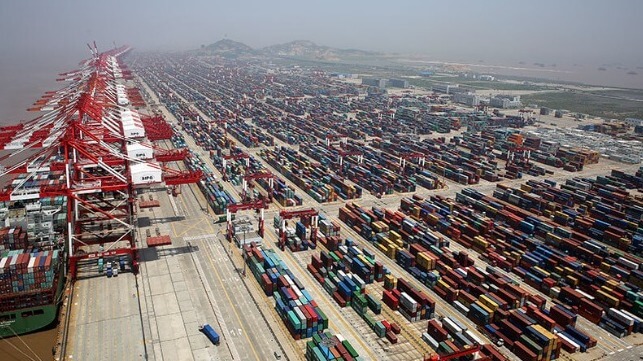The Cost of Shanghai’s Lockdowns for European Companies

With the rest of the world returning to the pre-pandemic levels of normality, China has maintained a strict zero-COVID policy. Lockdowns and rapid mass testing are still commonplace in Chinese cities. Unfortunately, for foreign businesses that depend on China to boost their global revenues, the cost of operation is becoming burdensome.
The European Union Chamber of Commerce in China was the first to sound the alarm based on findings of a flash survey it conducted in April. It involved 372 European companies primarily based in Shanghai. For nuance, the results were contrasted with an earlier Business Confidence Survey (BCS) that the European Chamber in partnership with Roland Berger conducted in mid- February.
Overall, China’s current COVID-19 containment policy is creating an uncertain business environment. 75 percent of the respondents reported a negative impact on overall operations, with businesses not knowing if their premises will be suddenly shut down or get enough staff to maintain operations.
The main impacts have been felt in logistics and warehousing, where 94 percent of the respondents said that they are negatively affected.
Supply chains have also taken a pounding, both upstream and downstream, affecting 92 percent of the respondents. The main challenges include access to raw materials or components needed for production, struggling to transport raw materials or delivery of finished products within China, and to the rest of the world.
However, in the face of these problems, it begs the question whether the companies are pondering to exit China. The survey found that the majority plan to stay, with only 11 percent of the businesses reporting plans to downsize their operations in China. This demonstrates that most European companies are committed to China in the long-term and prepared to weather any storm for now.
“The rewards of staying the course and navigating the storm are plain to see. With a market of 1.4 billion consumers, some of the world’s best manufacturing clusters and, in more recent years, a vibrant innovation ecosystem, European companies view it as imperative to be part of China’s growth story,” said Joerg Wuttke, the President of the EU Chamber of Commerce in China.
However, the Chinese market has lost a considerable amount of allure for many companies, with 78 percent indicating that China’s COVID-19 measures have made it less attractive destination for investment.
Some of the hard-hit sectors - fashion and textiles - are important to container shipping, an early indicator of a possible supply-chain shift in Asia.
“The main impact currently is the disruption of logistics to and from Europe, with 65 percent of the companies affected. Businesses have to adapt to new conditions, with rail freight between China and Europe no longer an option. Ships and trucks are also paying more for gas and oil due to rising material and energy costs,” notes the EU Chamber report.
Meanwhile, although the war in Ukraine is not an immediate concern for European businesses in China, a third of companies revealed the war is also a factor affecting China’s attractiveness as an investment destination. With China increasingly trading with Russia, and seemingly appearing as an ally, companies are concerned by geopolitical tensions, in particular the prospect of a deterioration in EU- China relations.
